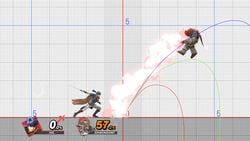Angle: Difference between revisions
Anthony1996 (talk | contribs) No edit summary |
No edit summary |
||
| Line 1: | Line 1: | ||
{{ArticleIcons|series=y}} | {{ArticleIcons|series=y}} | ||
{{disambig2|the hitbox property|attacks that can be pointed in different directions|angling}} | {{disambig2|the hitbox property|attacks that can be pointed in different directions|angling}} | ||
[[File:TrainingSSBU.jpg|thumb|250px|The exclusive [[Training Mode]] stage in ''[[Super Smash Bros. Ultimate]]'' shows the angles and trajectories of where the targeted character could be sent.]] | [[File:TrainingSSBU.jpg|thumb|250px|The exclusive [[Training Mode]] stage in ''[[Super Smash Bros. Ultimate]]'' shows the angles and trajectories of where the targeted character could be sent. The red, green, and blue lines correspond to the angle and trajectory for 0% damage, the current damage percentage, and 100% damage, respectively.]] | ||
The '''angle''' of an [[attack]] is what direction it sends opponents when it connects, such as horizontally, vertically, or diagonally. Many attacks have multiple [[hitbox]]es that possess slightly (or even significantly) different angles, so opponents being hit by different parts of one attack can be sent in different directions. Angle is a basic property of all hitboxes that has a major effect on an attack's effectiveness as a whole. | The '''angle''' of an [[attack]] is what direction it sends opponents when it connects, such as horizontally, vertically, or diagonally. Many attacks have multiple [[hitbox]]es that possess slightly (or even significantly) different angles, so opponents being hit by different parts of one attack can be sent in different directions. Angle is a basic property of all hitboxes that has a major effect on an attack's effectiveness as a whole. | ||
Revision as of 11:17, September 9, 2018

The angle of an attack is what direction it sends opponents when it connects, such as horizontally, vertically, or diagonally. Many attacks have multiple hitboxes that possess slightly (or even significantly) different angles, so opponents being hit by different parts of one attack can be sent in different directions. Angle is a basic property of all hitboxes that has a major effect on an attack's effectiveness as a whole.
The angle of a hitbox is defined as a number of degrees and can span any integer number, where 0 equals "away from the attacker", 90 equals "straight up", 180 equals "towards the attacker", and 270 equals "straight down"; negative angles such as -90 can also be used (and depending on the game can carry an additional meaning). The definition of "away" versus "towards" is based on where the attacker and the opponent are positioned, not the hitboxes and hurtboxes involved. In SSB and Melee, this results in some attacks being able to send opponents in unexpected directions; Fox's back air and Captain Falcon's Knee Smash in Melee are notable examples of cases where players intentionally try to land "reverse" hits for combo purposes. Starting in Brawl, it is possible for a hitbox to define whether this behaviour holds, or whether the opponent is always sent in a specific direction, which is used to eliminate many of these cases.
Generally, no one angle is better than any other; two otherwise identical attacks that have differing angles will often have different purposes. One of the most dramatic of these comparisons is in Melee: despite Fox's and Falco's Reflectors having very similar properties, and both being central to their characters, they have completely different usages in competitive play. A character that lacks a type of move within one of these broad classes (for example, a vertical KO move) will often be at a disadvantage compared to a character that has at least one of every option.
- Vertical-angle attacks are suited for aerial combos and juggling, and are more effective at KO'ing floaty characters.
- Attacks of horizontal angle aid combos composed of ground attacks, and are more effective at KO'ing fast-fallers.
- Purely horizontal angles, known as semi-spikes, are especially deadly as they provide no height with which to recover.
- Downward angles, known as meteor smashes, are very dangerous to offstage opponents and are usually good combo-starters onstage, although these attacks can be meteor canceled in Melee and Brawl.
- In Melee, an attack that sends opponents in a downward angle outside of the window between 260 and 280 degrees is called a spike; an attack with this angle functions similarly to a meteor smash, but the knockback cannot be meteor canceled, making it even more lethal offstage. In the other games, all downward-angled attacks count as meteor smashes.
Special angles
Certain angles are dynamic, changing the exact direction they launch based on additional factors.
- The Sakurai angle changes from horizontal to diagonal as the knockback delivered increases, allowing for grounded battles at low damage and maximum knockback distance at high damage.
- Various autolink angles match the direction and strength of knockback to the attacker's movements in an attempt to more consistently link multi-hit attacks together.